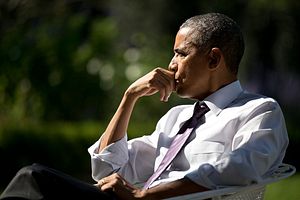During the Deng Xiaoping era, China’s foreign policy was characterized by the phrase “tao guang yang hui,” generally translated as “keeping a low profile.” In recent years, however, observers have begun to question whether this strategy still holds sway in Chinese diplomacy, particularly in light of Xi Jinping’s recent exhortation for China to practice “major power diplomacy.”
Chinese media just turned that debate over on its head, by positing that it’s Washington, rather than Beijing, that is entering a period of “low profile” foreign policy today.
An article in Xinhua, published online Wednesday, posits that the U.S. has turned inward and is entering its own period of tao guang yang hui. The article argues that America’s “confidence and power” to “interfere” in external affairs has weakened over the past six years, with President Barack Obama preoccupied with domestic economic development. The lede cites Obama’s philosophy of “don’t do stupid stuff” as evidence.
The piece interviews Chinese experts who agree, as Xinhua puts it, that the U.S. inward-focus is growing “more and more obvious” and that “for the last two years of Obama’s term, [the U.S.] may enter an American-style period of ‘keeping a low profile.’”
One of the experts who contributed to the debate is scholar Wang Jisi of Peking University, who notes that although the U.S. isn’t in an irreversible decline, “U.S. influence on global political affairs has obviously declined.” The reason for this, Wang says, is a combination of weakening influence and power among U.S. allies (notably in Europe and Japan) and the rise of developing countries like China. Wang and another expert, Xu Changyin of Xinhua’s own World Affairs Research Center, both argue that Obama will try to focus on internal economic issues for the remainder of his term.
When Obama does turn his attention to foreign policy, Wang defines the “essence of Obamaism” as “restraint and withdrawing,” particularly a heavier reliance on allies and partners to share risks and responsibilities.
From Wang’s perspective, this is a positive. The Xinhua piece as a whole agrees, praising Obama for “stabilizing China-U.S. relations,” particularly through the emphasis on military communications with China to lower the risk of conflict. The article predicts that Obama will avoid military conflict with Russia and will not be forced into deploying ground troops to the Middle East (Xinhua even believes Obama’s administration will “warm” relations with Bashar al-Assad in Syria). To Xinhua, none of the issues where Obama is being pressured to be “tougher” (whether the Ukraine crisis or the South China Sea disputes) fundamentally affect U.S. national security – thus there’s no need to become overly involved.
The piece concludes that Obama’s successor may want to adjust policy to be “more proactive, tougher, and more daring,” but will not be able to ignore the pressing need to focus on domestic problems with the economy, social equality, and education. Xinhua admits that the U.S. won’t give up its “plot for global hegemony,” but will have to change its strategy as its abilities not long match its ambitions.
China’s tao yang guang hui strategy is understood to mean an emphasis on internal affairs over external affairs – “keeping a low profile” on the world stage as China focused its energies on developing its economy. With China’s growing willingness to play a larger international role, including founding its own organizations like the Asian Infrastructure Investment Bank, some experts have concluded that China’s time for “keeping a low profile” is past. Ironically, however, Xinhua believes that the U.S. is now being forced to adopt its own version of this strategy – an argument that bolsters claims that the torch of global leadership is being passed on.

































